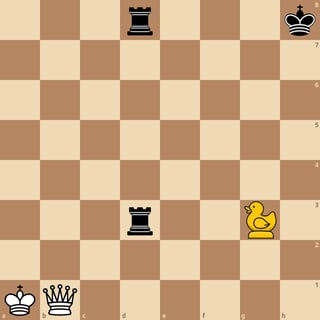In the chess variant Duck Chess (full rules), each player moves the shared blocking "duck" piece to any free square on their turn, taking away one or more moves for the opponent.
One immediate consequence of this is the failure of "distant defence": If there are free squares between the defender and the defended, the connection can be efficiently severed by the duck.
Example: The white queen can safely capture the rook on d3, and black can not recapture if the duck is then placed on any square d4-d7
This is but one way that the duck nerfs sliding pieces. Additionally:
- Duck blocking is a common way to stop a threat. Knight attacks can not be blocked.
- The duck can at most take away one square from a knight. For a sliding piece it can be a whole ray. (Bishops more trappable?)
Does this mean knights are relatively more valuable in duck chess than in standard chess?

